|
|
|
Sort Order |
|
|
|
Items / Page
|
|
|
|
|
|
|
| Srl | Item |
| 1 |
ID:
094810
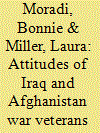

|
|
|
|
|
| Publication |
2010.
|
| Summary/Abstract |
U.S. policy banning openly gay and lesbian personnel from serving in its military rests on the belief that heterosexual discomfort with lesbian and gay service members in an integrated environment would degrade unit cohesion and readiness. To inform this policy, data from a 2006 survey of Iraq and Afghanistan war veterans are analyzed in this study. Views of these war veterans are consistent with prior surveys of military personnel showing declining support for the policy: from about 75 percent in 1993 to 40 percent in this survey. Among the demographic and military experience variables analyzed, comfort level with lesbian and gay people was the strongest correlate of attitudes toward the ban. War veterans indicated that the strongest argument against the ban is that sexual orientation is unrelated to job performance and that the strongest argument in favor of the ban is a projected negative impact on unit cohesion. However, analyses of these war veterans' ratings of unit cohesion and readiness revealed that knowing a gay or lesbian unit member is not uniquely associated with cohesion or readiness; instead, the quality of leaders, the quality of equipment, and the quality of training are the critical factors associated with unit cohesion and readiness.
|
|
|
|
|
|
|
|
|
|
|
|
|
|
|
|
| 2 |
ID:
108096
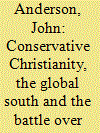

|
|
|
|
|
| Publication |
2011.
|
| Summary/Abstract |
This article explores conservative Christian contributions to debates over sexual orientation, focusing in particular on the way in which Northern Christians struggling to win their battles at home look to the global South for allies and support. This is made easier by the fact that global Christianity is once more overwhelmingly a Southern religion that generally adheres to traditionalist understandings in the sphere of sexual relations. The article looks at how this has played out at church, state and international levels by examining the conflicts over sexuality within the Anglican Communion, the domestic and international debates about the controversial Ugandan draft law on homosexuality, and discussions about sexual orientation in UN institutions. It concludes by rejecting simplistic suggestions that these are part of a one-way process, in which Northern conservatives use their counterparts in the global South to promote their own agendas.
|
|
|
|
|
|
|
|
|
|
|
|
|
|
|
|
| 3 |
ID:
088940
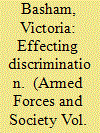

|
|
|
|
|
| Publication |
2009.
|
| Summary/Abstract |
In recent years, the British military has introduced a number of policies aimed at recruiting and sustaining demographically diverse armed forces. Central to these is a "zero-tolerance" approach to discrimination and harassment. However, by undertaking an "effective" reading of policies aimed at managing sexual orientation and gender diversity, and by drawing on qualitative research with members of the British forces, this article demonstrates how the military's own implementation strategies facilitate discrimination against some recruits. It concludes that although the British military is understandably keen to protect its operational effectiveness, by clinging to unreflexive claims about the nature of social cohesion, and in failing to respond to societal demands for inclusion, military officials are undermining the social legitimacy of the armed forces. By extension, they are destabilizing, rather than protecting, their capabilities
|
|
|
|
|
|
|
|
|
|
|
|
|
|
|
|
| 4 |
ID:
178889
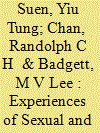

|
|
|
|
|
| Summary/Abstract |
While China's Constitution says everyone is treated equally before the law, employment discrimination continues to exist. This paper breaks new ground by analysing a quantitative survey of more than 10,000 lesbian, gay, bisexual, transgender and intersex (LGBTI) people, the largest dataset of its kind to date in China. Only 5.1 per cent of respondents were completely open about their gender and sexuality at work. More than one-fifth reported experiencing negative treatment in the workplace. Transgender and intersex people reported higher rates of negative treatment, as did respondents with lower educational levels and lower incomes and those residing in towns. Employer policies against discrimination were rare, but when in place, they were significantly associated with less negative treatment. These findings highlight an almost completely neglected segment of the workforce and document discriminatory experiences that could be addressed by changes in discrimination law and by employer policies and practices related to diversity and inclusion.
|
|
|
|
|
|
|
|
|
|
|
|
|
|
|
|
| 5 |
ID:
175150
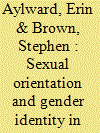

|
|
|
|
|
| Summary/Abstract |
Canada’s Feminist International Assistance Policy (FIAP), launched in June 2017, marks the first time that sexual orientation and gender identity (SOGI) have been mentioned in an overarching Canadian aid policy. The inclusion of SOGI in the policy document sent an important signal to domestic and international development partners on the need to consider these sources of discrimination and marginalization. This article asks two basic research questions. First, what is the place of SOGI in Canada’s “feminist” international assistance? Second, what additional steps does Canada’s development program need to take to protect the rights of lesbian, gay, bisexual, transgender, and intersex (LGBTI) people in the Global South? Based on an analysis of official documents and secondary sources, we argue that FIAP itself sends only a weak signal about the importance of SOGI-related concerns, but Canadian foreign aid has expanded its understanding of LGBTI issues and has begun to commit dedicated resources to addressing them. Nonetheless, the initial programming (2017–2019) was channelled in an ad hoc manner and through one, major stand-alone commitment, rather than through a broader framework that would guide SOGI’s integration into Canadian programs over the long term. If serious about addressing LGBTI rights more systematically, the Canadian government needs to expand its definition of what SOGI entails and move beyond niche programming to recognize the cross-cutting dimension of LGBTI rights in foreign aid, especially in the area of sexual and reproductive health and rights.
|
|
|
|
|
|
|
|
|
|
|
|
|
|
|
|
|
|
|
|
|